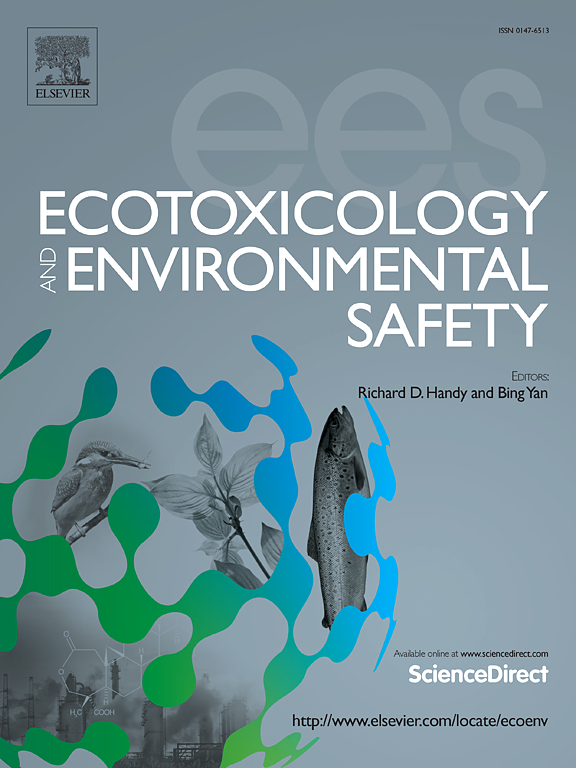母体接触柴油颗粒会改变肠道微生物群,并诱发大鼠后代肺损伤。
IF 6.2
2区 环境科学与生态学
Q1 ENVIRONMENTAL SCIENCES
引用次数: 0
摘要
母体接触空气污染物会抑制胎儿的肺部发育。柴油机废气颗粒(DEP)是颗粒物污染的最主要来源之一。母体接触 DEP 对母体和后代肠道微生物群以及胎儿肺部发育的影响仍不清楚。在这项研究中,经过时间推移的 Sprague Dawley 怀孕大鼠在妊娠期第 16-21 天接受了 100 μL 磷酸盐缓冲盐水(PBS)或 100 μL PBS 中的 DEP(250 μg)的鼻内给药。母体在足月时经阴道分娩。出生后第 0 天和第 7 天,从下胃肠道采集肠道微生物群样本。采集右肺和回肠末端,进行组织学、细胞因子和8-羟基-2'-脱氧鸟苷(8-OHdG)分析。在出生后第 0 天,接触过 DEP 的母鼠和母鼠接触过 DEP 的子鼠表现出巨噬细胞能吞噬柴油微粒,肺泡实质中的巨噬细胞数量增加。在出生后第 0 天和第 7 天,与对照组母鼠的后代相比,接触过二乙胺苯丙酮的母鼠的后代表现出明显较低的肠道紧密连接蛋白表达量、较高的肺 8-OHdG 和细胞因子水平以及严重的肺损伤。对照组母鼠和暴露于DEP的母鼠的微生物群组成和多样性没有明显差异。母体暴露于DEP会改变出生后第0天和第7天的肠道微生物群的组成和多样性,在出生后第7天对后代的影响更为显著。就其机制而言,后代的肺损伤可能与母体暴露于二乙基磷导致的肠道微生物群落改变和代谢途径失调有关。本文章由计算机程序翻译,如有差异,请以英文原文为准。
Maternal diesel particle exposure alters gut microbiota and induces lung injury in rat offspring
Maternal air pollutant exposure inhibits fetal lung development. Diesel exhaust particles (DEP) are one of the most substantial contributors to particulate matter pollution. The effects of maternal DEP exposure on gut microbiota in mothers and offspring and fetal lung development remain unclear. In this study, time-dated pregnant Sprague Dawley rats received intranasal administration of 100 μL phosphate-buffered saline (PBS) or DEP (250 μg) in 100 μL PBS from gestational days 16–21. The dams were permitted to deliver vaginally at term. On postnatal days 0 and 7, gut microbiota was sampled from the lower gastrointestinal tract. The right lung and terminal ileum were harvested for histological, cytokine, and 8-hydroxy-2′-deoxyguanosine (8-OHdG) analyses. On postnatal day 0, the dams exposed to DEP and rat offspring with maternal DEP exposure exhibited macrophages that phagocytized diesel particles and increased numbers of macrophages in the alveolar parenchyma. On postnatal days 0 and 7, the offspring of DEP-exposed dams exhibited significantly lower intestinal tight junction protein expression, higher lung 8-OHdG and cytokine levels, and substantial lung injury compared with the offspring of the control dams. No significant differences were observed in the microbiota composition and diversity between the control and DEP-exposed dams. Maternal DEP exposure altered the gut microbiota composition and diversity on postnatal days 0 and 7, with more significant effects observed in the offspring on postnatal day 7. Regarding the mechanism, lung injury in offspring may have been linked to altered gut microbiota communities and dysregulated metabolic pathways caused by maternal DEP exposure.
求助全文
通过发布文献求助,成功后即可免费获取论文全文。
去求助
来源期刊
CiteScore
12.10
自引率
5.90%
发文量
1234
审稿时长
88 days
期刊介绍:
Ecotoxicology and Environmental Safety is a multi-disciplinary journal that focuses on understanding the exposure and effects of environmental contamination on organisms including human health. The scope of the journal covers three main themes. The topics within these themes, indicated below, include (but are not limited to) the following: Ecotoxicology、Environmental Chemistry、Environmental Safety etc.

 求助内容:
求助内容: 应助结果提醒方式:
应助结果提醒方式:


